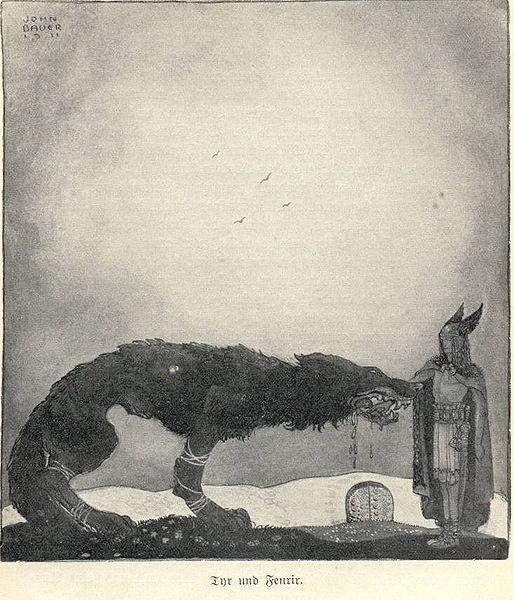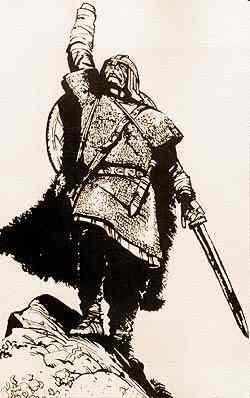Tyr is amongst the most amazing and mighty of the Norse pantheon, as he is the Aesir god of war, the equivalent of the god Ares in the Greek pantheon. However, unlike Ares, who is known as being dishonorable and sometimes even cowardly, Tyr is renowned as the bravest of all the Norse deities in the myths, and the greatest warrior outside of Thor. In fact, amongst the gods his strength is said to be surpassed only by that of the thunder god. His skill with all weapons of combat are rivaled by few amongst all pantheons of deities known in Earth history, he is also revered as a god of justice, and due to this he functions as the overseer of the Thing, the Asgardian council comprised of the 12 most influential deities in the pantheon who handle their political affairs and legal arbitration. Tyr's sense of justice can, however, be seen as "tough" by some, and though many followers of the Norse pantheon call upon him in this capacity due to his ability to grant victory against even seemingly overwhelming odds to those mortal reverents who call upon him for aid, he can be rather choosy in regards to who he helps, or to what extent, which is why many mortal followers of the Nordic path will prefer to call upon the god Forseti for a more neutral delivery of justice. Nevertheless, Tyr is greatly respected by all who follow the path of the ancient Norsemen, and many consider him their Patron God.
Tyr is said in some sources to be the son of the giant Hymir, the great beer-brewer, and the latter's spectacular cauldron for brewing was absconded from his possession by his own son while on a mission with Thor, as told in one of the surviving myths featuring Tyr. However, this isn't the myth that Tyr is most well known for. That myth is undoubtedly the one which most clearly demonstrates Tyr's immense bravery and sense of sacrifice for the greater good, as that is the tale describing how he acquired perhaps his most distinguishing physical feature: the loss of one of his hands. When Odin, king of the deities, insisted that the giant Fenris Wolf (also called Fenrir) was too dangerous to be left roaming freely amongst the fields of Asgard, the deities tried and failed to come up with a tether strong enough to bound the powerful lupine beast. Finally, the dwarves were commissioned to create an enchanted strand of rope called Gleipnir, which they said would succeed where all other tethers failed. The problem, however, was to convince Fenris to allow himself to be tethered by it. Suspecting a trick, the giant wolf only agreed to allow the rope to be placed around his neck if one of the deities present would put his hand within the canine's maw; if the tether held, then Fenris would bite. Only Tyr had the courage to make this required sacrifice to bound the danger of the Fenris Wolf, and as a result, his right hand was bitten off. To honor this great sacrifice, Tyr was nicknamed the "Leavings of the Wolf," which became a kenning for the pursuit of glory in the old Norse language.
It should be noted that many historians of the ancient Norse religion believe that evidence exists to suggest that long before the Age of Vikings, Tyr was once held by mortal worshippers of the religion's oldest version as a sky god who was the head of the pantheon, but was later demoted in this status in favor of Odin, and surpassed in popularity by the latter king of the deities and Thor amongst the pantheon's mortal worshippers. Nevertheless, Tyr's status within the pantheon nevertheless remained a high one as he was one of the judges who arbitrated legal matters for the deities, and often for mortals who revered them. Tyr has been called variant names by other European cultures who worshipped the Norse deities, including Tiu in Old English (the basis for the day 'Tuesday'), and Tiwaz by the Teutonic Knights, the Teutons being the predecessors of the modern Germans. In fact, one of the runes is referred to as 'Tiwaz,' and it's closely associated with Tyr.
I have, in the past, attempted to form a strong spiritual rapport with Tyr, only to find that he was less eager than I was to form a bond or come to my aid, in contrast to other deities in the pantheon such as Thor, Heimdall, Balder, and Frigga, whom I quickly became very close to. This is a known characteristic of Tyr, who can be quite picky regarding which mortal reverents of the Northern path he chooses to consider forming the equivalent of friendship and metaphysical bonding with, as even the esteemed contemporary Nordic author Freya Aswynn mentioned experiencing this from Tyr in regards to forming a bond with him in her book NORTHERN MYSTERIES AND MAGICK, resistance she didn't receive from some of the other deities. This is to be expected, as the deities, like mortals, have distinct personalities and individual preferences, and these factors will invariably determine whom on the Midgardian (Earth) plane they most closely bond with, and for what reasons. Despite this, my respect for Tyr and the role he plays in the pantheon, along with the fact that he embodies victory against the greatest of adversity, is immense.



